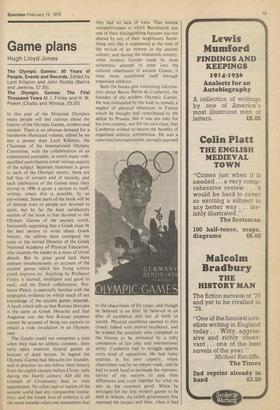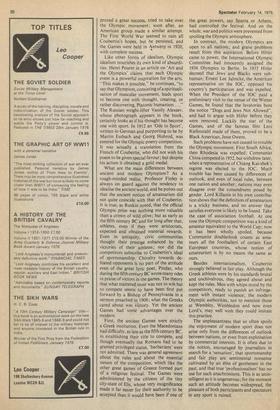Game plans
Hugh Lloyd Jones
The Olympic Games: 80 Years of People, Events and Records. Edited by Lord Killanin and John Rodda (Barrie and Jenkins, £7.50).
The Olympic Games: The First Thousand Years M. I. Finley and H. W. Pleket (Chatto and Windus, £5.00)
In this year of the Montreal Olympics many people will feel curious about the history of the Olympic Games, modern and ancient. There is an obvious demand for a handsome illustrated volume, edited by no less a person than Lord Killanin, the Chairman of the International Olympic Committee, with the collaboration of an experienced journalist, in which many wellqualified contributors cover various aspects of the subject. Separate treatment is given to each of the Olympic sports; there are full lists of winners and of records; and each celebration of the Games since their revival in 1896 is given a section to itself, written, where this is possible, by an eye-witness. Some parts of the book will be of interest even to people not devoted to sport, but by far the least satisfactory section of the book is that devoted to the Olympic Games of the ancient world. Innocently supposing that a Greek must be the best person to write about Greek history, the editors have consigned the topic to the retired Director of the Greek National Academy of Physical Education, who swamps the reader in a mass of trivial details. But by great good luck there appears simultaneously an account of the ancient games which few living writers could improve on. Anything by Professor Finley is learned, intelligent and good to read; and his Dutch collaborator, Professor Pleket, is especially familiar with the epigraphic evidence on which much of our knowledge of the ancient games depends. A book which tells us that Roman Hercules is the same as Greek Heracles and that Augustus was the first Roman emperor cannot be accused of being too esoteric to obtain a wide circulation in an Olympic year.
The Greeks could not remefnber a time when they had no athletic contests; their early epics mention funeral games in honour of dead heroes. In legend the Olympic Games had Heracles for founder, and in practice we can follow their history from the eighth century before Christ: only during the fourth century AD did the triumph of Christianity lead to their suppression. No other race or nation of the ancient world had any comparable institution; and the Greek love of athletics is all the more notable when one remembers that
they had no lack of wars. That intense competitiveness in which Burckhardt saw one of their distinguishing features was not shared by any of their neighbours. Something very like it reappeared at the time of the revival of an interest in the ancient culture; and during the nineteenth century, when modern Europe made its most systematic attempt to enter into the cultural inheritance of ancient Greece, it once more manifested itself through organised athletics.
Both the books give interesting information about Baron Pierre de Coubertin, the founder of the modern Olympic Games. He was stimulated by the wish to remedy a neglect of physical education in France which he thought had contributed to the defeat by Prussia; but it was not only for his own country, nor for his own class, that Coubertin wished to secure the benefits of organised athletic competition. He was a convinced internationalist, strongly opposed to the chauvinism of his times; and though he believed in an elite, he believed in an elite of excellence and not of birth or wealth. Physical excellence seemed to him closely linked with mental excellence, and he wished the amateurs who competed in the Games to be animated by a lofty conception of fair play and international amity. Coubertin had to struggle against every kind of opposition. He had many enemies in his own country, where chauvinism was by no means weak; and he had to work hard to persuade the representatives of the nations to sink their differences and work together for what he saw as the common good. When he arranged for the first modern games to be held in Athens, the Greek government first opposed the project and later, when it had proved a great success, tried to take over the Olympic movement ; soon after, an American group made a similar attempt. The First World War seemed to ruin all Coubertin's hopes, but he persisted, and the Games were held in Antwerp in 1920, with complete success.
Like other forms of idealism, Olympic idealism nourishes its own kind of absurdities. Henri Pouret in an article on 'Art and the Olympics' claims that each Olympic event is a powerful inspiration for the arts. "This makes it possible," he continues, "to say that Olympism, consisting of a spiritualisation of muscular movement, leads sport to become one with thought, creating, or rather discovering, Platonic humanism ..." The Russian weight-lifter Vassily Alexeev, whose photograph appears in the book, certainly looks as if his thought has become one with sport. In 1912 an 'Ode to Sport', written in German and purporting to be by Martin Essbach and Georg Hohrod, was entered for the Olympic poetry competition. It was actually a translation from the French of Coubertin, who did not wish his poem to be given special favour; but despite his action it obtained a gold medal.
What are the main differences between ancient and modern Olympism? As a tough-minded realist, Professor Finley is always on guard against the tendency to idealise the ancient world, and he points out that the ancient notion of amateurism did not quite coincide with that of Coubertin. It is true, as Ruskin noted, that the official Olympic prize was nothing more valuable than a crown of wild olive; but as early as the fifth century BC and for long after that, athletes, even if they were aristocrats, expected and obtained material rewards. Even in antiquity, civic communities thought their prestige enhanced by the victories of their athletes; nor did the competitors subscribe to Coubertin's ideal of sportsmanship. Chivalry towards defeated opponents is no part of the attitude even of the great lyric poet. Pindar, who during the fifth century BC wrote many odes in praise of victors in the games. The theory that what mattered most was not to win but to compete seems to have been first put forward by a Bishop of Pennsylvania in a sermon preached in 1908; what the Greeks cared about was victory. Yet the ancient Games had some advantages over the modern.
First, the ancient Games were strictly a Greek institution. Even the Macedonians had difficulty, as late as the fifth century BC, in establishing their title to compete, and though eventually the Romans had to be granted privileged status, 'barbarians' were not admitted. There was general agreement about the rules and about the essential nature of the competition, which like the other great games of Greece formed part of a religious festival. The Games were administered by the citizens of the tiny city-state of Elis, whose very insignificance made it far easier for their authority to be accepted than it would have been if one of
the great powers, say Sparta or Athens, had controlled the festival. And on the whole, war and politics were prevented from spoiling the Olympic atmosphere.
In contrast, the modern Olympics are open to all nations; and grave problems result from this aspiration. Before Hitler came to power, the International Olympic Committee had innocently assigned the 1936 Olympics to Berlin. In 1935 Hitler decreed that Jews and Blacks were subhuman; Ernest Lee Jahncke, the American representative on the IOC, opposed his country's participation and was expelled. When the President of the IOC paid a preliminary visit to the venue of the Winter Games, he found that the lavatories bore the notice "Dogs and Jews Not Allowed", and had to argue with Hitler before they were removed. Luckily the star of the Games, and of the famous film Leni Riefenstahl made of them, proved to be a Black American, Jesse Owens.
Such problems have not ceased to trouble the Olympic movement. First South Africa, then Rhodesia was expelled; Communist China competed in 1952, but withdrew later, when a representative of Chiang Kai-shek's regime was elected to the IOC. Much trouble has been caused by differences of outlook, and even of local rules, between one nation and another; nations may even disagree over the conundrums posed by gender. Lord Killanin in his own contribution shows that the definition of amateurism is a tricky business, and no answer that satisfies everyone is likely to be found. Take the case of association football. At one time the Olympic competition was a kind of amateur equivalent to the World Cup; now it has been wholly spoiled, because Communist doublethink counts as amateurs all the footballers of certain East European countries, whose notion of amateurism is by no means the same as ours.
Besides internationalism, Coubertin strongly believed in fair play. Although the Greek athletes were by his standards brutal and unchivalrous, they agreed about and kept the rules. Men with whips stood by the competitors, ready to punish an infringement with instant violence; the modern Olympic authorities, not to mention those at Wembley, Wimbledon and now even Lord's, may well wish they could imitate this practice.
The unpleasantness that so often spoils the enjoyment of modern sport does not arise only from the differences of outlook between 'nations, or even from exploitation by commercial interests. It is often due to the notion, encouraged by journalists in search for a 'sensation', that sportsmanshp and fair play are sentimental nonsense cultivated by an elite of gentlemen in the past, and that true 'professionalism' has no use for such anachronisms. This is as unintelligent as it is ungenerous; for the moment such an attitude becomes widespread, the pleasure of both participants and spectators in any sport is ruined.



































 Previous page
Previous page